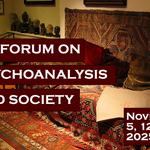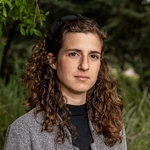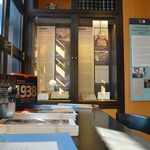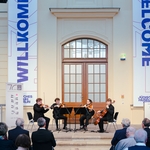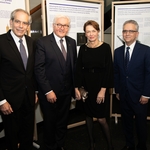Exile in the Spotlight: How Kurt Hirschfeld made Zurich into the World Stage for German Theater

- Autor
- David Brown
- Datum
- Mi., 21. Okt. 2015
After the Second World War, the theater designer Teo Otto—one of the most prolific men in his profession in the 20th century— reminisced about his first conversation with Kurt Hirschfeld, the German-Jewish theater director who made Zurich the home of uncensored German theater during the Nazi years:
In 1933, as millions packed their bags, I hoped to find new footing in the uncertainty of foreign countries. I chose Zurich. I tied up my bundle and, like a miracle, […] two phone lines crossed: his from Zurich and mine from Remscheid—right at the exact same second. I picked up the receiver, and he was there; he picked up the receiver, and I was there. The thread that tugged on destiny was named Kurt Hirschfeld. With his savvy way of working and his exceptional human understanding he seems to be deployed by fate as a high- ranking fisherman, who at any rate had landed Hartung, Lindtberg, Horwitz, Kaiser, Steckel, Ginsberg, and Therese Giehse from the roiling political sea. The positive way in which he spoke of his colleagues—his friends—[…] inspired me to stay and to unpack my bundle.” —Teo Otto
Otto’s words were among the letters and documents brought to life by German actors Stefan Kurt (Berliner Ensemble) and Friederike Wagner (Schauspielhaus Zurich) during the first international conference on the legacy of Kurt Hirschfeld, which LBI presented at the Schauspielhaus Zurich on March 8–9, 2015. On December 6, 2015, German-American actors and theater scholars will again explore Hirschfeld’s legacy at the Center for Jewish History.
The ensemble of refugee Jews and Marxists that Hirschfeld assembled in Zurich—from the expressionist theater pioneer Gustav Hartung to the distinguished actress and original “Mother Courage” Therese Giehse—would keep the best traditions of German theater alive during the Nazi years. Almost immediately after the Nazis rose to power, Hirschfeld’s company sounded a direct protest with incendiary pieces like Ferdinand Bruckner’s antifascist drama The Races.
After 1938, Hirschfeld shifted the focus to classical works, especially those of the Enlightenment dramatist Schiller. “Pieces like Wilhelm Tell or Don Carlos (with its much-quoted plea for “freedom of thought”) now had an educational function—they were meant to convey the idea of freedom,” said Ursula Amrein, a professor of German at the University of Zurich who pre- sented a paper at the LBI conference in Zurich. The return to classics, though perhaps less risky than unambiguous provocations like The Races, was still a rebuke to fascism. Once lauded by Goebbels as an ideal Führer-Drama, even Wilhelm Tell was banned in German theaters and schools in 1941, in part for its tendency to elicit applause at what the Nazis considered the wrong moments.
In her talk at the Zurich Conference, Wendy Arons, Professor of Drama at Carnegie Mellon University, also pointed to Hirschfeld’s extraordinary influence on the introduction of international works into the German-language repertoire. “Many of these plays—for example, Tennessee Williams’ The Glass Menagerie and Thornton Wilder’s The Skin of Our Teeth—opened in Zurich only a few years after premiering in English, an indication of just how much the leadership of the Schauspielhaus had its finger on the pulse of the international theater scene.” Arons will deliver the keynote presentation at the December 6 event in New York.
Aktuelles
